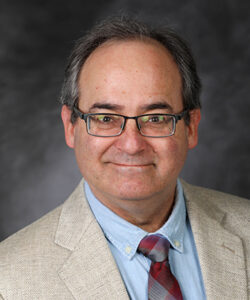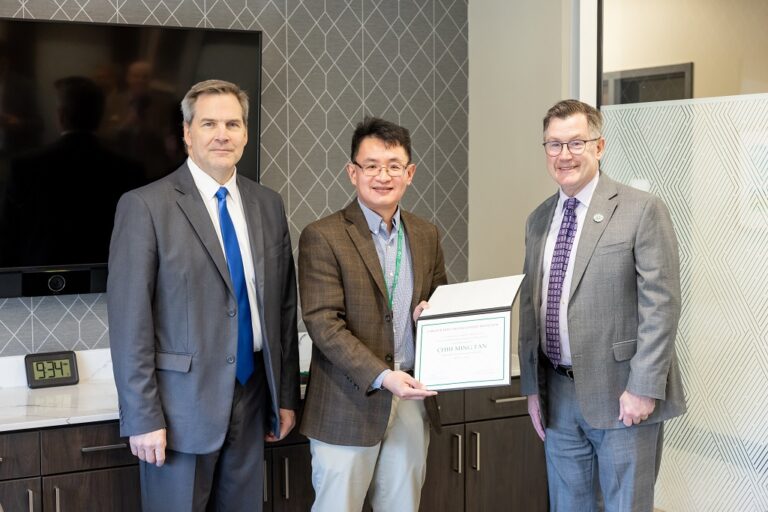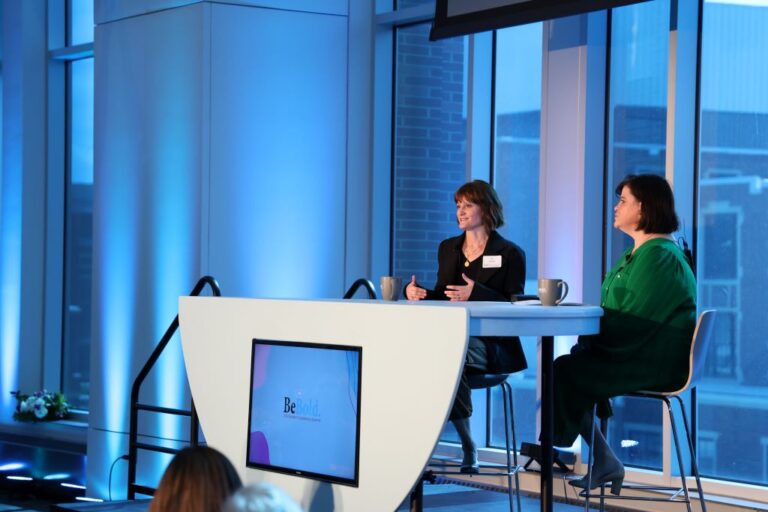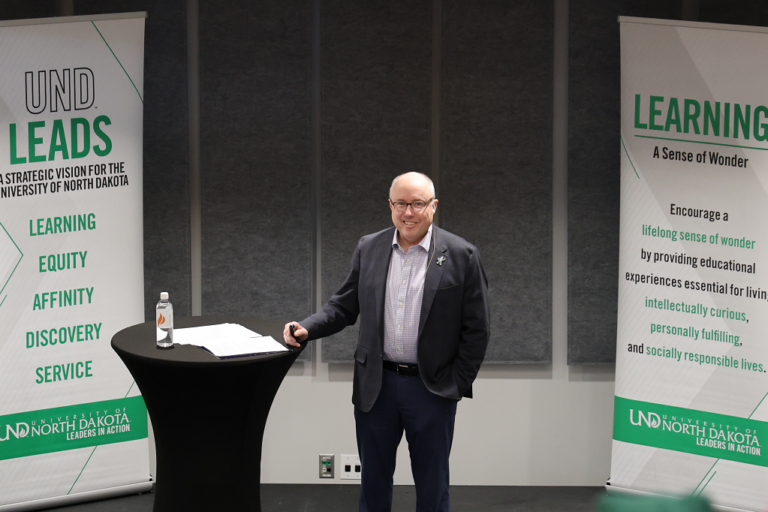Horror, then unity and determination
Members of the UND community share their memories of Sept. 11, 2001

Editor’s note: In conjunction with the Office of the President, UND Today recently solicited recollections of that fateful morning of Sept. 11, 2001, just over two decades ago. Where were you? How did the events move you? How did they impact all of our lives?
Responses from members of the UND community are below.
* * *
‘Where were my kids?
On Sept. 11, 2001, Jed Shivers and his wife, Sandee, lived and worked in Connecticut, not far from New York City. Jed now serves as UND’s Vice President for Finance and Operations and Chief Operating Officer; Sandee retired a few years ago as CIO at New York Medical College, after a career working in hospitals, medical schools and the corporate world.
Their responses to the question posed by UND Today are below.
Sandee Shivers: I was working at GE in Connecticut with direct reports all over the world. That day, I started a routine conference call with London. Once I had everyone on the call, one of the women asked me if I really wanted to continue the call. My answer was, “Yes; why not?” She asked if we had a TV in our office and told us that we should turn on the news. She knew my oldest son was a pilot for American Airlines.
Of course we saw immediately what was happening. I stopped the call and switched gears.
What she didn’t know was that my pilot son had a flight out of New York that morning – a flight that had just taken off. Nor did she know that we’d put his younger brother and wife and daughter on another flight out of New York that had also just departed.
Now the crazy stuff started. GE had offices across the street from the World Trade Center. We needed to get employees out of New York quickly and safely and set them up in another office somewhere. Meanwhile, I reached my husband, but I could not contact either of my children.
Our onsite VP near the World Trade Center moved so quickly that the entire staff from that office had left the city before the traffic jams and other issues tied up the access routes. They were out of the building and on their way out before the second plane hit and before police and firefighters arrived. That VP was amazing and quick thinking.
But, where were my kids? I didn’t know what their flight numbers were. There was no way to find out who the pilots or passengers were on the planes involved during the first few days.
Late on the night of the disaster, my older son was able to get through by phone to tell me he had been directed to land in Canada and was dealing with passenger issues. He didn’t get home for nearly a week.
But, we heard nothing from our other son and his family. His wife’s mother was calling in a panic every few hours to see if we had any news. This went on for 48 hours before I was finally able to reach them. They’d been forced to land in Las Vegas but were unable to rent a car or find transportation home. Eventually, they found a group of kind strangers who had a van going in their direction (California), and after two days of driving and dropping others off, they finally reached home and answered the phone. It had not occurred to them to contact us or her mother.
Three months later, I went to work for a company whose offices were directly across the river from the World Trade Center. The trains were not running so for the next two years, so I sat in New York traffic driving to work. Then every day upon arrival, I looked out of my office windows at the scarred skyline and watched as they rebuilt the area.
But my new company had lost a whole division (25 people) in the disaster. It was so traumatic for the staff to look across the river daily at what used to be the World Trade Center that the company eventually broke its lease and moved the offices further inland in New Jersey.

Jed Shivers: In the 1970s, my college classmates and I ate at Windows on the World when we visited New York City. In 1980, during my first job after graduate school, I used to have meetings with New York State mental health administrators on or near the World Trade Center’s 100th floor, and we could feel the building swaying a bit. Sometimes the clouds were below us.
In 2001, we lived in a Connecticut suburb of New York City. Days before 9/11, my wife and I went on a tour boat with Dr. John and his band, and we and the rest of the audience sailed around lower Manhattan – including the World Trade Center – listening to that N’awlins sound.
It was a gorgeous day. The water was calm, the skies were clear, and the WTC was where it always was – dominating the skyline of lower Manhattan.
On 9/11, I was driving when I got word of the attack. I headed back to the Dean’s Office at the Yale University School of Medicine, where I worked. All of the hospitals in the region were emptying their elective beds in order to prepare for the surge of the injured, but it was clear that people either walked out or didn’t make it.
Within months of 9/11, my wife starting working in Jersey City, directly across the Hudson River from the ruins of the WTC. She was the CIO for an insurance company. Large insurance firms had offices in the World Trade Center, and the employees in her company had a direct view of the fall of the buildings, knowing that their friends were inside. The company eventually relocated to another city – I think because of the inescapable vision.
Everyone in our area directly knew someone who died or knew someone who knew someone. That experience is not something that ever leaves you.
Stunned silence

On 9/11, I was a college student studying elementary education in Moorhead, Minn. The moment the first planes crashed, I was observing with other preservice teachers in an elementary classroom. The teacher was up front talking to the students when another staff member came in and whispered something to the teacher. Those of us observing were quietly and hurriedly told to go home immediately, with only a note of, “The World Trade Center has been attacked.”
I drove to my dorm room and turned on my TV just in time to see the second plane crash into the towers on live news. It was an unreal and unbelievable sight and experience. My brain couldn’t comprehend that these events were taking place in real time in and around New York City, Pennsylvania and our nation’s capital.
Sadly, this has become a series of events etched into my memories and heart. I can still clearly visualize the school I was in, the small TV in my dorm room, and sitting in my next class on campus in stunned silence before we were excused from attending class that day.
Being a future teacher, I bought and held onto a book created by students and a teacher at Masterson Elementary School in Kennet, Mo., called “September 12th: We Knew Everything Would Be All Right.” Viewing these events through the words, illustrations, and perspective of these students helped me see a way to move forward despite tragedy.
Sonja Brandt
Assistant Professor, Elementary Education Methods, Teaching and Leadership
A key factor
I was a senior in high school. A bomb threat was called into the school, and we were moved to the football field right after the first tower fell. In all the confusion, I got pulled out of school by my mom, who told me that my step-dad’s parents were flying that morning, and we didn’t know the status of the flight.
Later, we learned that their flight got diverted to a remote island in the Atlantic. They were stranded there for almost a week before flights resumed.
9/11 was a key factor in me joining the military and being deployed to the Middle East in 2012.
Christopher Tutt
UND engineering student
U.S. Army veteran, Afghanistan
Hardinsburg, Ky.
Caring for one another

I was a junior at the University of South Carolina and was getting ready to attend my Tuesday morning linguistical anthropology class when I turned on the news. I saw the smoke coming from the towers and watched until the first tower fell.
In addition to me being a student, I was an Air Force veteran and a volunteer firefighter with the Columbia (S.C.) Fire Department. Not knowing what was going on and with Columbia being home to a major Army base and other potential targets, I emailed my professor to let her know that I was skipping class to staff my station.
It was a day of great sadness knowing what those in NY, PA, and VA were going through, but also a day of great pride. What still sticks out the most to me is how this country came together as one and how much we cared for one another.
Tim Burrows
Director, University Assessment and Accreditation
Office of the Provost and Vice President for Academic Affairs
Comforting a friend

I was a junior at the University of Notre Dame. That morning, my roommate and I were still in bed in our dorm room when our phone in the dorm rang. (These were the days before cell phones, so we had only a landline in our room.)
Because our beds were lofted, our friends and family knew that if we were in bed, we wouldn’t climb down to answer. They had been told if it was something important to call twice … the phone rang again. It was my roommate’s boyfriend, who had been dismissed from classes and was at the outside door of our dorm, calling to be let in.
He came into our room and immediately turned on the TV. We were glued to the television and watched in horror as the towers collapsed.
I tried to call my parents 600 miles away in Pennsylvania, as my dad travels a lot and lately had business in New York City, but I couldn’t get through. We checked on friends in the dorm who were from the New York area, and similarly, they couldn’t get through to their friends and families.
I remember comforting a friend who was a New Yorker, as we sat with around 20 other girls in my dorm on the floor in the hallway. It was scary; it was confusing. There were questions: who did this? Is my family OK? Is it over, or will they strike again?
And more mundane, now seemingly trivial questions: will I still have by finance exam tomorrow? Are the dining halls open? What about football on Saturday?
Later, everyone in the university community gathered on the quad for Mass which – even though I’m not Catholic – I felt I needed to attend, as it was just where we needed to be.
Looking back, I see that while that day was horrifying, it was also one of my college memories that most embodied solidarity and a campus community and the nation as a whole coming together in the wake of something so terrible.
Jennifer Stoner
Assistant Professor, Marketing
Twists of fate

I was not yet living in the US on 9/11 – but I absolutely remember where I was and what I was doing. I was the co-Director of the University of Toronto at Scarborough’s Vincent W. Braden Library, and at 9:15 that day, I was sitting in my shared office with my friend and co-Director, Marla Miller.
We were deep into working on plans for continuity of library services while we were planning a brand new Academic Resource Center, to include the Library, IT, an Art Gallery, Student Services, and more.
Suddenly, a colleague ran into our office and said “Another plane hit the World Trade Center” (we all remembered a past attempt). At first we weren’t sure whether it was an attack or an unrelated accident, though the latter seemed unlikely. Minutes later, the second plane hit, and all doubt was gone.
No one worked that day. We all clustered around computers and TVs, as CNN’s site kept crashing.
Years later, in 2007, I took a job in New York City, eventually becoming Chief Librarian & Executive Director of Academic IT at Brooklyn College. There, my colleagues told me of standing on the rooftops of college buildings, watching across the East River as the second plane hit.
The wife of one librarian actually worked in WTC2, at a brokerage firm. The only reason she is alive today is that she realized she accidentally left some materials for an afternoon presentation for an important client at home, and turned around to drive home.
By the time she got home, the Towers had been hit. She didn’t go back, of course.
There also were several librarians working in legal and corporate libraries in the Towers; they were killed. It was hard hearing how badly some of my New York colleagues had been affected.
Stephanie Walker
Dean of Libraries & Information Resources



